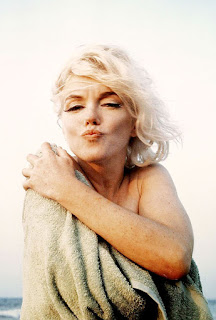 |
| The famous girl in red who serves as a catalyst in the change within Schindler's attitude, symbolizing every Jew he wasn't able to save. |
Let's put everything aside for the moment; Spielberg's first Academy Award, the event that it was that everyone saw, how important it is not only to the Jewish people, but for the world at large, etc. I want to talk about the filmmaking, because if I talked about absolutely everything, I'd never finish this post.
Most of all, let's talk directing. Spielberg said his decision to shoot in black and white was because he didn't want to 'prettify' any images of the Holocaust. Apparently the studio insisted for a while that he shoot in color, and he assured them that if that was the case, he wouldn't have made the film. The lights and shadows harken to something out of Orson Welles. His long time DP (Director of Photography for the layman) Janusz Kaminski is truly a paragon of his craft. He made the events of the Holocaust and the events in Schindler's life so seamless as he moves from shmoozing with Nazi's in the first scene, the the chaos of Jews pretending that they have 'essential' factory skills so that they would get a blauschein (a blue card) meaning that they could go to work for Schindler (Liam Neeson) instead of being loaded up into trucks headed for death camps. His fluid camera captures the most aggressive and most intimate moments ranging from the liquidation of the Krakow Ghetto to a conversation between Schindler and his wife.
As a historical epic (and that's what it is, not just a bio-pic), Spielberg utilized suspense so brilliantly it astounds me even today, considering that I've seen the film way too many times (like there even such a thing). A very iconic example of this is when Amon Göth (Ralph Fiennes) stands atop his balcony with a rifle killing people off one by one. He's aiming for a young Jewish boy who told him that he couldn't clean his bathtub as much as he tried. Amon tells him (as Schindler instructed when he said that power comes from pardon) that he pardoned him, changed him mind and after a few missed shots, as the kid walks away, aware of his fate, eventually gets shot in the back.
 |
| 'I pardon you'. |
Another suspenful and heartbreaking scene is when a machinist gets examined by Göth, because Göth (like most Nazi's) takes his bloodlust to the extreme, and decides to kill him on the basis that he didn't make enough hinges. He knocks him to the ground and pulls the trigger, but the pistol jams. Through tears, the man tries to explain why his work was 'unsatisfactory' as Amon keeps trying to fire over and over again. Finally, he gives up and pistol whips him. The man survives, and is the one that writes the letter to the Soviets in case Schindler was captured that every Schindler worker signs on his behalf.
Now let's talk about the writing and acting. There is so much more going on than the story itself, and even with characters that have just a couple of lines, it pulls you into this film, this story, this world as if it's almost matter-of-fact. There is small humor here and there, especially with the Nazi's. A good example of this is when his accountant Itzhak Stern (Ben Kingsley) gets mistakenly put on a train to a camp, and Schindler goes to rescue him, despite his efforts, low-ranking Nazi's won't let him off. Schindler takes down their names and says; 'Thank you gentlemen, I think I can guarantee you that you'll both be in Southern Russia before the end of the month, good day'. Then the film cuts to Schindler walking along the train pass and yelling for Stern, while the low-ranking Nazi's follow him doing the same. Now that's good writing.
 |
| One of the most iconic scenes in the film of which I just spoke. It is so compelling, so terrifying, and so brilliantly executed, that it is the hallmark of perfect directing. |
But Spielberg doesn't shy away from the stuff none of us want to see, because we don't want to think that the greatest mass genocide in modern human history happened only 60 some years ago. He does this very subtly. A man sorting valuables, obviously those that Jews who are now in camps had to give up gets handed a burlap bag, inside which are a few handfuls of gold teeth. The man takes off his glasses in disbelief, as do we if we had glasses. But back to this later.
 |
| Making the list. |
A very important character is Poldek Pfefferberg (Jonathan Sagall) who actually wrote the book that the film is based on. He survived from the start of the Holocaust to the liquidation of Krakow to standing next to Schindler as he says a tearful goodbye to his workers at the very end. He is a rogue character. The first time we see him, he's mad at another seller on the black market for giving him shoe polish in glass containers instead of metal and threatens his co-conspirator. Schindler overhears his tenacity and offers him a job buying things on the black market that will be needed to shmooze with more Nazi's and eventually trade for the lives of his Jews. His mass fortune which was made by profiteering off of free labor from Jews at his company, he eventually gave up to save everyone he possibly could. 'They say that no one dies here, they say your factory is a haven, they say that you are good' a woman tells him who is desperate to bring her elderly parents into Schindler's factory. She dresses up in fancy borrowed clothes and puts on rouge and lipstick to appeal to Schindler. At first, he's furious at the fact that he's considered a Moses among the Jews, but his conscience catches up with him and he trades his cigarette lighter, his cigarette case, ties, pins, suits; everything, for his own humanity, and for theirs.
Moreover, this is not a film about Schindler, and it is not a film about the Holocaust either. This is a film about history. A history that has been preserved in survival accounts, photographs, testimonies, etc. But someone had to put the pieces together and give us a narrative that not only educated us, but touched and enlightened us. The chaos, the deplorability, the horror, and the sorrow birthed a film that in itself is history, which taught us a very important thing through its fly-on-the-wall aesthetic; That (as the ring that the surviving Jews give to Schindler says) 'He who saves one life, saves the world entire'.
 |
| 'It's Hebrew from the Talmud, it says he who saves one life saves the world entire'. |
Even watching it now, after so many times I can't even count, there are moments of terror, moments of contemplation, anger, but mostly moments of awe in the worst way. This is our history, not just the Jews, but all of us. A time where survival was more important than any sort of life, where hiding in excrement meant the difference between life and death, where there was real evil in the world, and eventually the righteous triumphed over it. This happened, and no one has ever or since brought it to film more comprehensively, with more brevity, and with such a sincere heart.
Below some related clips:














































